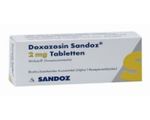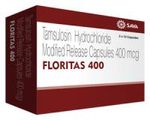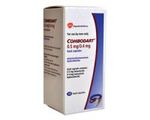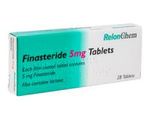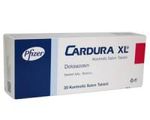The prostate is a gland that only men have. The organ is located in the lower abdomen, just below the bladder, and is responsible for the production of seminal fluid. This fluid, together with the sperm cells, forms the sperm. At a young adult age, the prostate gland is about the size of a walnut. However, the prostate continues to grow under the influence of the male sex hormone. This can cause complaints in the long run.

Prostate
Treatments
- All treatments
- Prescription medicines
- Non-prescription medicines
- Relevance
- Name A-Z
- Name Z-A
- Price low-high
- Price high-low
How does Dokteronline work?
At Dokteronline, you can get expert advice from doctors quickly, without the hassle of visiting your GP’s surgery. Take care of your health with reliable treatments and information from the comfort of your home.
Select your preferred treatment
The doctor will review your medical request
The pharmacy will ensure your medication is delivered to your doorstep
What is an enlarged prostate?
Every man's prostate continues to grow. This happens under the influence of the male sex hormone testosterone. In the beginning there is not much to notice. But around the age of 50, men can suffer from prostate enlargement. This mainly results in urinary complaints. The older a man is, the bigger the prostate gets and the more likely there is to be prostate problems.
Not every man has to deal with this: although the prostate gets bigger in almost all men, around 30% of men have complaints as a result.
What are the causes of prostate complaints in the event of an enlarged prostate?
The prostate gland is like a ring around the urethra. This may seem awkward, but it is necessary to transport the seminal fluid to the urethra at the time of ejaculation.
As the prostate expands, the tissue can slightly compress the urethra. In addition, the enlarged prostate may irritate the bladder. All this can lead to urinary complaints.
Many people are afraid that an enlarged prostate is a symptom of prostate cancer. However, this is not usually the case. An enlarged prostate can be associated with prostate cancer, but this is not always a characteristic of prostate cancer. In most cases it concerns a so-called benign prostate hyperplasia (BPH), i.e. a benign prostate augmentation.
Apart from the enlarged prostate, there are other factors that influence urination. In this way, the decrease in muscle strength also plays a role. A weaker bladder and pelvic floor muscles, for example, can make it difficult for you to urinate properly. This leaves urine in the bladder, which in turn can lead to irritation and urinary tract infections.
What prostate complaints are there due to an enlarged prostate?
An enlarged prostate does not cause symptoms in everyone. There are men with an enlarged prostate who do not suffer from anything. In that case, the prostate will mainly increase on the outside, so that the glandular tissue does not pinch the urethra.
If the glandular tissue mainly grows on the inside of the prostate, the urethra will get stuck more quickly. This causes urinary problems.
Some men think that prostate enlargement also causes erectile dysfunction or pain. But those are not specific symptoms of an enlarged prostate.
Erectile dysfunction can occur after prostate surgery or due to medication for urinary complaints. In addition, erectile dysfunction, like prostate enlargement, is more common in later life. However, these conditions usually have nothing to do with each other.
Prostate pain is usually associated with prostate inflammation, and this condition has no direct link to an enlarged prostate either.
How can you recognise prostate complaints in the event of an enlarged prostate?
A prostate enlargement can cause urinary problems. This happens when the enlarged prostate slightly compresses the urethra. The urine can then flow less smoothly. In addition, the enlarged prostate can push against the bladder. All this causes urinary problems with the following symptoms:
- It takes a while for the urine stream to get going
- Urinating takes longer than before
- The urine stream is weak and/or interrupted
- Burning sensation when urinating
- There are more cases of after dribbling
- The bladder seems to be rather full, there is a faster urge to urinate
- Disturbed night's sleep, having to get out of bed at night to pee
- The urine can no longer hold up well or for a long time
Some of these symptoms may also have other causes, such as cystitis, diabetes, obesity or constipation (constipation of the intestines). That is why it is a good idea to visit your family doctor when you have urinary problems.
If the doctor suspects that your symptoms are caused by the prostate, he or she will examine the prostate. The doctor then feels with a finger through the rectum whether the prostate gland is enlarged and whether the shape or structure of the gland is different. This is called a rectal examination.
You should also probably have blood taken. During the blood test, the PSA value is examined. PSA stands for prostate specific antigen, a substance produced in the prostate gland. In the case of benign prostate enlargement, this value may be slightly increased. If the result is very abnormal, the doctor can refer you to a urologist. A high PSA value can in fact indicate a prostatitis. Sometimes a high PSA value is caused by prostate cancer.
A urologist will further investigate the cause of the prostate enlargement. This doctor can, for example, do an ultrasound or an MRI scan. The bladder function is also usually examined and it is measured how powerful the urine stream is and whether there is any urine left behind in the bladder. In addition, you usually have to keep a urinary diary. You will then note for 24 hours how much you drink and how much you urinate.
Is there anything I can do myself about prostate complaints?
A benign prostate enlargement is part of ageing. You cannot influence the growth of the prostate yourself. Doctors still do not know exactly why the prostate is getting bigger. Therefore, it is not possible to prevent prostate complaints caused by prostate enlargement.
If you suffer from urinary complaints due to an enlarged prostate, a number of treatments is possible.
What are the forms of treatment?
If the prostate is enlarged but causes few other complaints, the doctor will opt for a wait-and-see policy. This means that you stay under supervision with the urologist. This doctor will then monitor your PSA value and will also regularly check the size of the prostate. This treatment method is called 'vigilant waiting'. As long as the symptoms do not cause too much inconvenience, nothing has to be done.
If you have a number of urinary complaints due to a benign prostate enlargement, there are several treatment options. For example, you may be given medication. But you can also be operated on the prostate.
Medication
When treating prostate complaints with medication, doctors often first prescribe a so-called alpha 1 blocker. Medications from this group relax the smooth muscles in the urethra and prostate. This makes it easier for the urine to flow through the urethra. Medicine that belong to the alpha 1 blockers are, for example, alfuzosin, doxazosin and tamsulosin. If the symptoms have still not improved after 6 weeks, there is no point in continuing to use the medication.
Another medicine used in the treatment of benign prostate enlargement is the 5-alpha reductase inhibitor. Medicines from this group cause the prostate to shrink slightly. As a result, the trapping of the urethra is somewhat reduced and the urethra complaints are reduced. The medicine is usually given together with an alpha 1-blocker. Medicines from the group 5-alpha reductase inhibitors are for example finasteride and dutasteride. The following applies here as well: if the symptoms do not diminish after a number of weeks, it is better not to continue to use the product.
Medicines against prostate enlargement can also cause side effects, although not everyone who takes the product suffers from them. Side effects of alpha 1 blockers include gastrointestinal complaints and headaches. Side effects of 5-alpha reductase inhibitors include erectile dysfunction and reduced sex drive.
Operation
A surgical procedure is used when medication does not help enough against the prostate complaints. Prostate surgery is usually performed by inserting an instrument into the urethra. From there, prostate tissue is removed by burning, lasering or evaporation. This creates more space for the urethra and improves the flow of urine. Occasionally, the procedure is done via the abdominal wall.
After the operation it will take a few weeks before the effect is optimal. Most men notice after three months that the urinary problems are gone.
Prostate surgery usually has no effect on erectile dysfunction. However, in men who were already suffering from erectile dysfunction prior to surgery, these symptoms may increase slightly.
However, most patients suffer from a so-called dry orgasm after the procedure: no more sperm is ejaculated. This is because the sperm fluid will no longer flow to the urethra, but towards the bladder as a result of the operation. The sperm is then pissed out. This does not do any harm, but it does have consequences for fertility. If you still want to have a child, it is wise to discuss this with the urologist before the procedure.
Alternative treatments
In addition to regular medicines, there are also a large number of natural (food) substances that would have a beneficial effect on the prostate. The most frequently mentioned alternative products for prostate complaints are:
- Saw palmetto (Serenoa repens)
- Prunus africana (Pygeum Africanum)
- African potato (Hypoxis rooperi)
- Tomato
- Pumpkin seed (oil)
- Nettle
There are also preparations available that combine some of these (or other) products.
Lifestyle changes
A healthy lifestyle cannot prevent the prostate from growing. It does, however, make sure that you are less affected by the prostate complaints. An adapted lifestyle can also prevent or reduce other conditions that in turn cause urinary complaints. For example, obesity, diabetes and obstipation (constipation).
A few tips for a healthier lifestyle:
- Drink at least 1.5 litres but preferably 2 litres per day. Some men think that they will need to urinate less often if they take on less fluid. Not drinking enough increases the risk of bladder infection and constipation, which means that you have to go to the toilet more often.
- Drink enough during the day, but do not drink any more from two hours before bedtime. This means that you will not have to urinate as often at night.
- A healthy diet with lots of vegetables, fruit and fibres helps prevent constipation.
- Watch your weight. Try to lose weight if you are too heavy. Obesity can cause urinary complaints but also plays a major role in the development of type 2 diabetes.
- Move enough. It improves your condition and increases your resistance. In addition, movement helps to prevent or deal with obesity. You do not have to go to the gym every day. Walking, gardening or cycling outside is also fine.
- Train your pelvic floor muscles. If they are very weak, this can contribute to urinary problems such as incontinence (loss of urine). The doctor can give you exercises that strengthen the pelvic floor muscles, or send you to a pelvic floor physiotherapist.
- Alcohol and caffeine stimulate the bladder. So it is better to leave spirits and coffee in the cupboard.
- Do not put off urinating for too long.
Sources
Treatments for an enlarged prostate – Prostaat.nl. (z.d.). Consulted on 19 April 2019, from https://www.prostaat.nl/behandelingen/behandelingen-vergrote-prostaat/
Debruyne, Prof. Dr F. (z.d.). Enlarged prostate – causes and treatment | Andros Mannenkliniek. Consulted on 19 April 2019, from https://www.andros.nl/prostaatklachten/vergrote-prostaat/
I’m having peeing problems | Home doctor. (z.d.). Consulted on 19 April 2019, from https://www.thuisarts.nl/plasklachten-bij-mannen/ik-heb-plasklachten
Can I prevent an enlarged prostate? | Andros Mannenkliniek. (2017, 25 September). Consulted on 19 April 2019, from https://www.andros.nl/artsenblog/vergrote-prostaat/vergrote-prostaat-voorkomen/
Medicines for an enlarged prostate (BPH) – Prostaat.nl. (z.d.). Consulted on 19 April 2019, from https://www.prostaat.nl/medicatie/medicijnen-vergrote-prostaat-bph/
Enlarged prostate (BPH) – Prostaat.nl. (z.d.). Consulted on 19 April 2019, from https://www.prostaat.nl/aandoeningen/vergrote-prostaat-bph/
Mictio complaints in men – Pharmacotherapeutic Compass (z.d.). Consulted on 19 April 2019, from https://www.farmacotherapeutischkompas.nl/bladeren/indicatieteksten/mictieklachten_bij_mannen
Frequently asked questions
What are the symptoms of prostate problems?
You may need to use the toilet more often. It may take some time to pass water, and afterwards you may feel that there is still urine in your bladder.
Can I do anything myself to ease prostate problems?
Drink plenty of fluids (2-3 litres), such as water or tea. Urinate as soon as you feel the need to. Empty your bladder completely.
